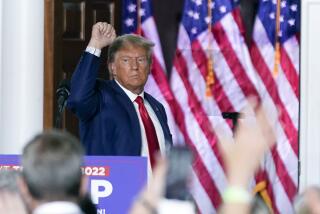Jeb Bush foreign policy: More stability and less ‘democracy’
Cooperative dictators can rest easier if Jeb Bush becomes president. Wednesday, in a speech delivered to the Chicago Council on Global Affairs, the latest Bush to set his sights on the White House implied that he wouldn’t be running around trying to spread democracy like his big brother, George W.
“New circumstances require new approaches,” Bush said in his remarks, while leaving it vague what those new approaches might be. In the question-and-answer session, though, he made it a little clearer. Asked about the balance between maintaining stability and pushing for democratic change, Bush said U.S. foreign policy, at least in the short term, needs to be practical.
“We have to balance our belief in liberty with a belief that security and engagement” will pay off down the line, Bush said. Just because a government holds an election does not mean American support should be automatic, he suggested.
Rather than sounding like a guy with new approaches, Bush seemed to be calling for a return to a more traditional foreign policy that depends on alliances with autocrats who keep the lid on chaos in regions such as the Middle East. In other words, a foreign policy more like his father’s than like his brother’s.
When George H.W. Bush went to war to push Iraq’s occupying army out of Kuwait, he famously stopped at the Iraqi border, not wanting to upset the Arab apple cart by driving on to Baghdad and overthrowing Saddam Hussein. When W. went to war, American tanks rolled all the way to the capital, toppled Saddam and stayed to fight for an additional 10 years.
Today, Iraq does have a shaky elected government, propped up by Iran and besieged by the invading terrorist army of Islamic State. That may or not be an improvement, but President Bush the younger can claim to have done what his father balked at doing; he replaced a dictatorship with a democracy.
That was the dream of Paul Wolfowitz and the other neoconservative theorists who handed the new president a ready-to-go foreign policy vision when he took office in 2001. They believed taking down Saddam and holding elections in one of the Middle East’s pivotal countries would set off a chain reaction. People would rise up, old regimes would fall and free elections would be held.
And their dream came true -- sort of. After weeks of street protests and demands for democracy, Hosni Mubarak was expelled from power in Egypt. Elections quickly followed and, not surprisingly, an Islamist party won. The Islamists were not especially liberal in their governing style and, when they grabbed for too much power, the army stepped in. Now, Egypt is run by a general with a harder fist than Mubarak’s.
Libya’s nutty, ruthless ruler, Moammar Kadafi, was dumped by his people as well, with a forceful assist from European and American air power. Elections were held. Hope was high for a very brief time. Now, competing militias battle for pieces of the country and Libya’s democratic government has little control over the spreading anarchy.
In Syria, a push for democracy was met by a ruthless response from the government of Bashar Assad. The ensuing cruelties of the Syrian civil war provided fertile ground for the rise of the horrific Islamic State insurgency.
Only in Tunisia has democracy gained anything close to a solid foothold. The rest of the Arab world is more dangerous and chaotic than ever.
If Jeb Bush wants to return to a time when Americans were a little less picky about the libertarian credentials of their friends in power, who can blame him? Still, he can hardly claim that’s a new vision in American foreign policy.
More to Read
A cure for the common opinion
Get thought-provoking perspectives with our weekly newsletter.
You may occasionally receive promotional content from the Los Angeles Times.











